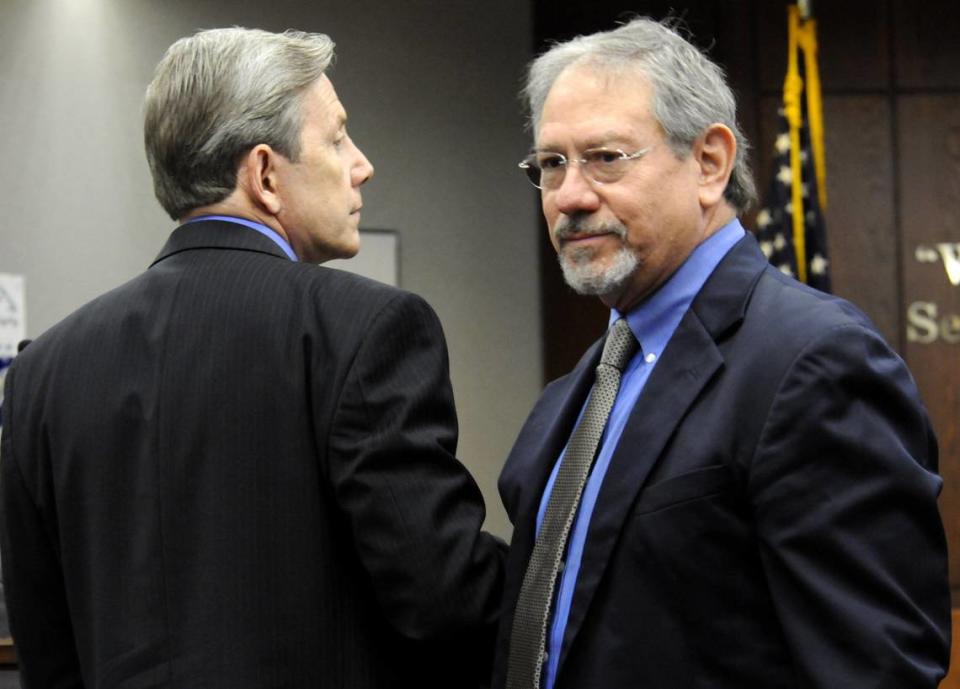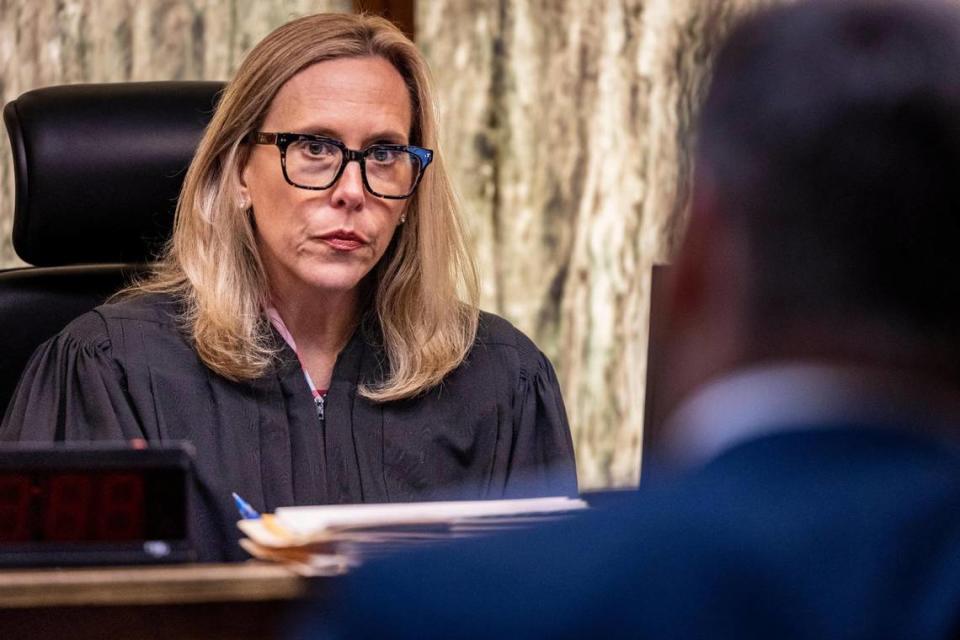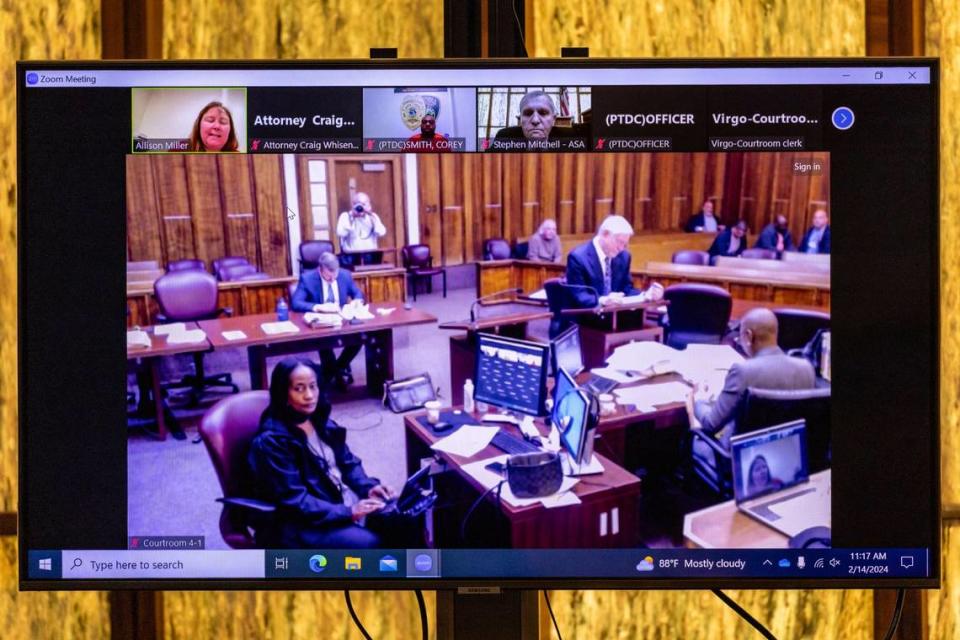Miami-Dade prosecutor removed from murder case a paradox: Hero to some, villain to others
There’s a famous movie scene of a U.S. colonel in a courtroom defending his actions as commander of an American outpost on Cuban soil. As he’s pressured by a much younger prosecutor to admit to misconduct, the fictional Col. Nathan R. Jessup, erupts: “You want me on that wall. You need me on that wall.”
Michael Von Zamft never had a wall to protect. But if victims in the Miami-Dade criminal justice system had one, he’d have stood sentry at it for the past five decades. Two weeks ago, though, the 76-year-old prosecutor finally rankled the wrong person when a Miami-Dade judge removed him from one of the state’s most high-profile murder cases. She had several reasons, including his attempt to arrange a jailhouse gathering of three witnesses in a murder trial.
“It reeks of the appearance of impropriety,” Miami-Dade Circuit Court Judge Andrea Wolfson wrote in her 15-page opinion.
Von Zamft would eventually retire from the state attorney’s office, likely ending a colorful 51-year legal career as both a prosecutor and a criminal defense attorney. The Florida Bar is reviewing the judge’s order and is expected to determine whether Von Zamft keeps his Bar card.
It’s a hard pill to swallow for some old school co-workers who nicknamed Von Zamft “Mad Dog.” And easier to digest for some counterparts who consider the seasoned prosecutor’s win-at-all costs attitude a pillar of the past.
“Is there a line you’re supposed to get to and not cross? If so, he gets right up to the line,” said Abe Laeser, a lifelong friend and former Miami-Dade prosecutor who retired 15 years ago. “He’s a [Miami] Beach kid from when the Beach was crap. He’s hardscrabble. He worked his way up. He’s a courageous lawyer who fought tooth and nail for every issue and every client.”
Others see Von Zamft differently. David Oscar Markus, a committee member with the National Association of Criminal Defense Lawyers, called prosecutorial misconduct “an epidemic in our system.”
“If a defense lawyer had come close to this conduct, he would be in handcuffs and charged with obstruction. But little is done to prosecutors who cross the line,” Markus said. “More needs to be done. Thankfully, judges like Wolfson... are pushing back against these bad actors.”
With Von Zamft’s legal standing up in the air, the prosecutor chose to turn down interview requests for this story.
“Based on the situation I’m in with the Bar complaint, it’s inappropriate for me to say anything at this time,” he said.
Prosecuted some of Miami’s biggest cases
During more than three decades of prosecuting some of South Florida’s most dangerous criminals, Von Zamft has never shied from trying to flip witnesses with deals, fighting opposing counsel from obtaining evidence, or skirting with the boundary of legal limits.
In one of the nation’s busiest prosecution offices, where state litigators are used to making national, even international headlines, Von Zamft’s strategies have led to some historic victories and some embarrassing defeats.
He was the lead prosecutor in the 2008 murder conviction of FBI agent John Connolly in Miami, who a jury determined partnered with Boston mobster Whitey Bulger to kill two men, including World Jai Alai owner Roger Wheeler.
And in 2014, Von Zamft successfully prosecuted Clifford Friend, 58 at the time, for killing his then-35-year-old wife Lynne, 20 years earlier. Her body was dumped in the Atlantic, seven miles off Miami Beach and never found.

There were also big losses, two in particular that involved animals and left two men exonerated — but scarred for life.
Von Zamft took the lead of a 2009 case in which prosecutors claimed an 18-year-old Palmetto Bay man killed as many as 33 cats, some dissected and left in posed positions in nearby homes. Vilified internationally, Tyler Weinman was charged with 19 counts of animal cruelty, four counts of burglary and 19 counts of wrongfully disposing of dead animals. The state eventually dropped the case after expert testimony determined the cats were more likely killed by a group of rogue dogs.
A year later, Von Zamft was forced to drop another case involving another animal. This time, his case against a 65-year-old man charged with having sex with a Great Dane named after super model Christie Brinkley collapsed when a half dozen witnesses took issue with the state’s findings.
Murder case that led to prosecutors’ removal
Now, Von Zamft’s attempt to re-try the sentencing of former John Doe gang leader Corey Smith, convicted of four murders more than two decades ago, was sidetracked after defense attorneys Craig Whisenhunt and Allison Miller petitioned the court to remove the Miami-Dade State Attorney’s Office for misconduct, in the lead-up to their client’s re-sentencing.
Though Wolfson said she found no evidence of a culture of corruption at the state attorney’s office that would lead to its removal from the case, the judge said there was reason enough to remove Von Zamft and his co-counsel Stephen Mitchell, who heads up the department’s gang unit.
Wolfson’s concerns ranged from a recorded jailhouse phone call in which Von Zamft is alleged to have attempted to get potential witnesses to coordinate testimony, to the manipulation of witnesses, to hiding records from opposing counsel about efforts to reduce sentences for testimony.
“The prosecutors in this case have lost sight of their responsibility, and justice demands their disqualification,” Wolfson wrote.
She tossed Mitchell, she said, not for anything he did during the hearing, but because, “Mr. Mitchell has unfortunately shown that he shares Mr. Von Zamft’s prosecutorial philosophy of winning at all costs, at least when it comes to the defendant’s case.”

Word of Wolfson’s March 6 decision had the hallways buzzing at the downtown criminal courthouse. It also caught the attention of some criminal justice groups. The Florida Association of Criminal Defense Lawyers called for an independent review of the state attorney’s office and all past convictions involving Von Zamft and Mitchell. Some want to review past jailhouse calls between Von Zamft and witnesses.
“It is time for State Attorney Katherine Fernandez Rundle to address the pervasive ethos that runs through her office,” the board of directors of the criminal defense attorneys group wrote in a post on its website.
Fernandez Rundle responded by saying top litigators in her office will study what went wrong in the Smith case and suggest the best path forward.
“The 24-year-old [Corey Smith] case is massive, and it will take my office some time to ensure that we are proceeding in accordance with the law and with justice,” the state attorney said. “Be assured that we will get the job done.”
A ‘Perry Mason’ moment: Judge
Von Zamft’s troubles with Wolfson stemmed from claims that prosecutors used questionable tactics to convict Smith, a Liberty City gang leader, more than two decades ago. The issue came to light after a 2017 change in death penalty requirements by the state’s Supreme Court, which led to the re-sentencing of Smith and dozens of other convicted murderers.
Smith, the boss of Liberty City’s John Doe gang, was first convicted in federal court in 1999 on drug and firearm charges. A year later, he was indicted by a Miami-Dade grand jury on 17 counts of mostly violent crimes, including murder. The John Does were a hardcore group that successfully fought for and overtook Liberty City drug holes, and who are named after the toe tags tied to bodies at the morgue.
By 2004, prosecutors led by Bronwyn Miller, who is now a judge on the 3rd District Court of Appeals, convicted Smith of murdering two men and two women either with connections to gang activity or who Smith feared would testify against him at trial. Smith’s re-sentencing was forced by a 2016 U.S. Supreme Court decision that led to a change in Florida’s death penalty law. The federal justices deemed Florida’s law unconstitutional because it only required a bare majority vote.
A year later, the Florida Supreme Court said a unanimous jury verdict was needed for a death sentence and ordered new sentencing trials for two murders in which Smith was found guilty by less than unanimous jury verdicts. Preparations for that trial were upended yet again in early 2023 when Gov. Ron DeSantis and Florida legislators — incensed that convicted Marjory Stoneman Douglas High killer Nikolas Cruz received a life sentence — again changed the death penalty law.
Now, only a two-thirds super majority vote is needed to sentence someone to death, providing a jury agrees unanimously on an aggravating factor like the crime being unusually cruel and heinous,
That all led to a pre-trial hearing for Smith’s re-sentencing earlier this month. In the hearing, Smith’s attorneys successfully argued that Von Zamft hid records from opposing counsel that showed a former girlfriend of Smith’s was to receive a more lenient prison sentence from an earlier case, for testifying at Smith’s trial two decades ago. Wolfson also said prosecutors appeared to stall handing over evidence during the discovery phase of the trial.
The judge also said she had problems with the brassiness of a recorded jailhouse phone call between Von Zamft and a co-defendant turned witness named Latravis Gallashaw. In that conversation, they discussed “rehabilitating” another witness and having Gallishaw meet with two others in the jail courtyard. Von Zamft told the judge he was trying to keep the witnesses safe.
“On television, Perry Mason, defense attorney extraordinaire, always managed to find the smoking gun at the end of every episode,” Wolfson wrote in her order. “In real life this happens very rarely. It happened here.”
‘The brassiness was even surprising to the judge’
Laseser, the former colleague who’s been friends with Von Zamft since they were 10, said it was common for senior prosecutors who wanted nothing to do with a difficult case, to pass it along to Von Zamft.
“Within the legal community, everyone knew Michael was going to fight like hell,” Laeser said. “Good lawyers go at it very hard. They kick each other in the shins.”
Von Zamft graduated from Miami Beach High in 1965, earned his law degree from the University of Miami and joined the Miami-Dade Public Defender’s Office by 1973, where he defended clients in first-degree murder and capital cases. In 1981, he went into private practice, where he continued to defend death sentences, even to the state’s Supreme Court.
By 1995, Von Zamft joined the Miami-Dade State Attorney’s Office. There, he continued to work on death penalty cases, but this time fighting for convictions instead of trying to get a client off the hook. More recently, Von Zamft sold his Surfside home. But before moving to Georgia and retiring full time, he agreed to take on the Smith case.
Though some believe Von Zamft plays fast and loose with ethical standards, his only real public admonishment came back in 2002, when he was dinged by the Florida Supreme Court over an action he took in a murder case that he was not involved with.
Von Zamft, who was friendly with the judge, ignored a request by the judge to drop the subject, and asked the judge over lunch one day to delay a trial date so the sides could have more time study evidence. After the judge was recused from the case, Von Zamft was admonished by the state Supreme Court and was fined $2,387.30 for inappropriately engaging the judge.
Miami defense Attorney Alex Saiz claims Von Zamft again acted inappropriately in a 2019 case in which the two attorneys faced off. Saiz said the case was derailed when Von Zamft took issue with Saiz’s client, who was accused of stealing something from a potential key witness in the Smith case.
Saiz, who is also a member of the defense lawyer’s association, says he was told that the state filed charges because it was trying to keep Von Zamft’s witness content. The witness was a former girlfriend of Smith’s who was being sketchy about testifying.
At one point, Saiz said Von Zamft pulled him aside outside Miami-Dade Circuit Court Judge William Altfield’s courtroom and said he’d drop the case if Saiz’s client produced the missing items.
Saiz said when his client refused, Von Zamft became incensed, admitted to him that this was all a favor for the potential witness and dropped the case right in front of the judge, saying he would simply re-arrest Saiz’s client after Smith’s trial.
That threat, Saiz said, continues to hang over his client’s head.
“It starts as an ethical issue, abusing the process to keep a witness from being deposed,” said Saiz. “We knew this was dirty. It’s just surprising how brazen this was. I think it’s absolutely malpractice. Never in my career have I had a prosecutor act this way in a case. The brassiness was even surprising to the judge.”
During Smith’s re-sentencing, Miami-Dade detective Kevin Rodriguez testified that his former girlfriend and others received death threats from the gang boss. Had Von Zamft not dropped the 2019 case involving Saiz’s client, it’s likely Rodriguez would have had to testify about the threats, something prosecutors opposed.

Miami Herald Staff Writer Jay Weaver contributed to this story

